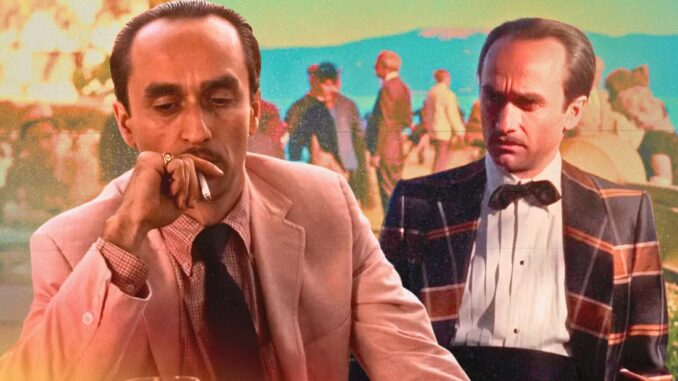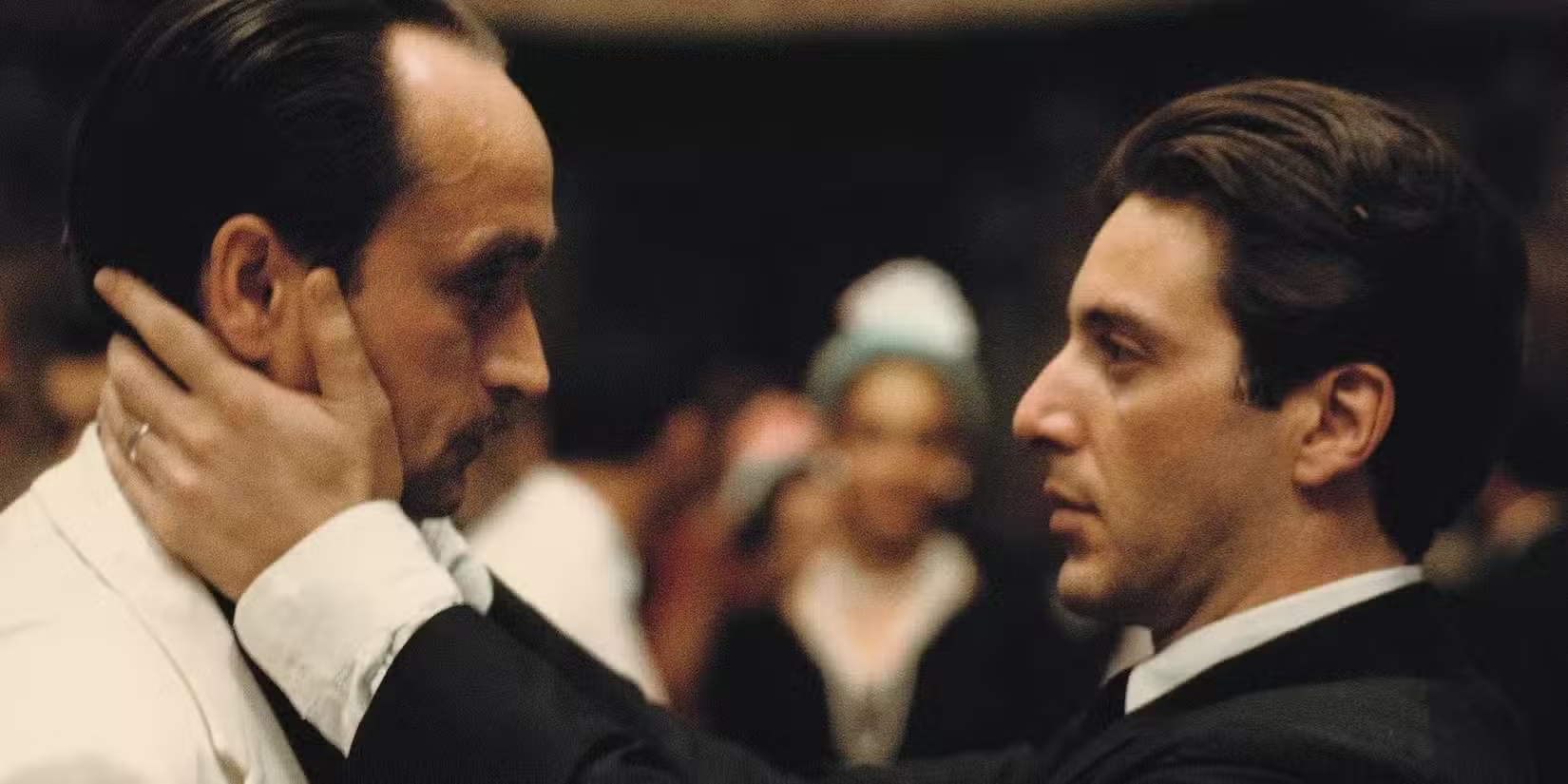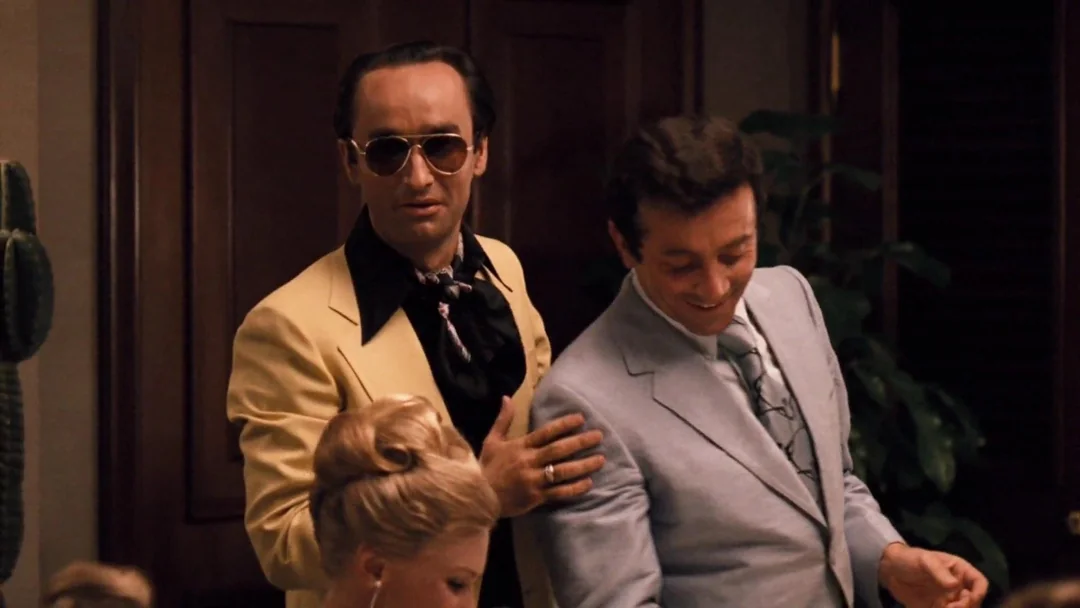
In The Godfather trilogy, one of the most haunting images is Michael Corleone ordering the death of his own brother, Fredo. This moment, in Part II, is often seen as the peak of tragedy in mafia cinema. Fredo is remembered as the betrayer: the weak brother who conspired with Johnny Ola and Hyman Roth, ultimately enabling an assassination attempt on Michael. But half a century after the film’s release, fans have begun to ask: did Fredo truly betray his family? Or was he merely a tragic, misunderstood figure, manipulated by forces greater than himself? This question not only reshapes how we see Fredo, but also unsettles the very foundations of The Godfather saga.

The Betrayal: Clear Evidence or Deliberate Ambiguity?
In The Godfather Part II, Michael survives an assassination attempt at his Lake Tahoe estate. The plot is traced back to Johnny Ola and Hyman Roth. Later, Fredo slips when he casually mentions: “Johnny Ola told me about this place.” At that instant, Michael realizes that his own brother had given away information to his enemies.
On the surface, the evidence is damning. Yet Coppola never shows Fredo signing an explicit pact to kill Michael. Fredo never confesses to plotting murder. He simply reveals information—perhaps naively, perhaps under manipulation. This deliberate ambiguity invites the question: did Coppola and Puzo want audiences to doubt whether Fredo was a true traitor?
Motive: Jealousy, Weakness, or the Desire to Be Seen?
Fredo was neither as fiery as Sonny nor as calculating as Michael. He was the overlooked sibling, constantly sidelined in family affairs. In the famous confrontation, Fredo cries: “I’m your older brother, Mike, and I was stepped over!”
This line reveals Fredo’s deepest wound. He did not want to kill Michael, nor destroy the family. He only longed for recognition and a chance to prove himself. To many fans, this makes Fredo less of a traitor and more of a tragic figure consumed by insecurity. Roth understood this weakness and used it, turning Fredo into a pawn.
Fan Theories: Fredo the Reluctant Betrayer
One popular theory argues that Fredo never grasped the full consequences of his dealings with Johnny Ola. He thought he was securing opportunities for himself, not enabling Michael’s assassination. From this perspective, Fredo was not a cold-blooded betrayer, but a weak man caught in a trap.
A bolder theory suggests that Michael exaggerated Fredo’s “crime” to justify eliminating him. In this view, Fredo was guilty not of betrayal but of incompetence. Michael, however, needed to project strength. By labeling Fredo a traitor, Michael legitimized an act that was, at its core, the most personal and cruel choice of his life.

The Consequence: Fredo’s Death and Michael’s Point of No Return
Regardless of Fredo’s intentions, his death marks Michael’s absolute moral collapse. In Part I, Michael killed his enemies but kept his family intact. In Part II, he destroyed his own bloodline, despite his mother’s pleas and Connie’s appeals for mercy.
Significantly, Michael waited until after his mother’s death to execute Fredo. The scene of Fredo praying the Hail Mary on Lake Tahoe, moments before being shot, is among the most tragic in cinema. It symbolized not just the end of Fredo, but the end of Michael’s humanity.
By Part III, this act returns as a haunting curse. Michael cannot escape the guilt of killing his brother. The shocking death of his daughter Mary in the final scene is often read as karmic punishment, echoing back to the sin of fratricide.
The Meaning: The Weakest Brother Becomes the Core of the Tragedy
If Fredo is viewed as a deliberate traitor, he becomes just another weak link in the Corleone chain. But if he is seen as a pawn, a victim of family neglect and mafia politics, his death elevates the entire saga into something far more devastating. Fredo did not deserve to die—but he did. And this injustice transforms Michael not into a savior of the family, but into its destroyer.
The question, then, is less about Fredo’s guilt and more about the nature of power. The Godfather is not a story about justice, but about dominance. In Michael’s world, truth can be twisted, loyalty can be conditional, and blood ties are expendable. The ambiguity surrounding Fredo forces us to confront the cost of power: that even innocence, or mere weakness, is not enough to guarantee survival.
